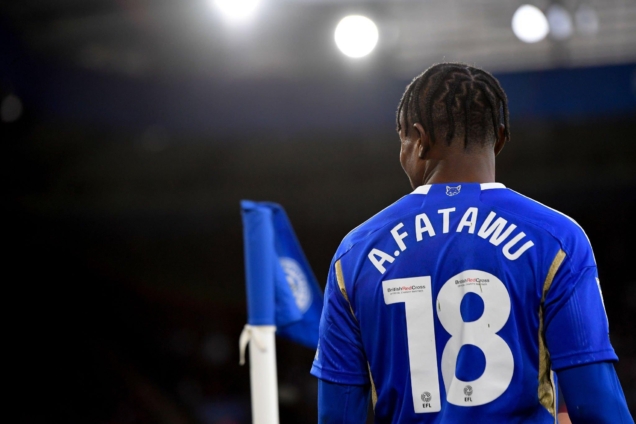Just when it seemed former Chelsea manager Graham Potter would replace Enzo Maresca—the latest to take charge of Todd Boehly's Blues—at Leicester City, the Foxes have moved to install Steve Cooper, most recently in charge of Nottingham Forest, in the King Power Stadium dugout.
Potter would, for sure, have been the more attractive prospect for most Leicester fans. Though his stock has admittedly fallen a bit after a dismal spell at Chelsea, Potter's previous body of work at Brighton & Hove Albion—garnished by the sort of football many would call ‘progressive'—remains a strong draw, making him a more natural successor to the like-minded Maresca.
Cooper, on the other hand, isn't exactly wedded to a specific approach.
In a statement announcing the Welshman's appointment this week, Leicester chairman Aiyawatt Srivaddhanaprabha made mention of Cooper's ability to “implement a dynamic style of play” as one of the reasons that informed the club's decision to hire him.

For “dynamic”, in Cooper's case, read “pragmatic”.
A coach leading a team in its first season (back) in the big-time needs to be just that, if he isn't already, to maximise chances of success. Leicester may have earned the right to be considered one of the Premier League's more formidable sides—especially after winning the title some seasons ago—but, following a season in the Championship, they have been pegged down a place or two.
Such humility is definitely needed in the Premier League, whose reputation as the toughest elite division in the world springs partly from the fact that the profile of its teams tends to fluctuate relatively quickly. A top-four team in one season can downgrade to an also-ran the next, a relegation survivor may swiftly make the transition required to push for a European place—that sort of thing.
You can imagine, then, that Leicester would find the league—and their place in it—has shifted significantly since they last featured. Playing as Maresca did in getting them promoted before departing, though admirable, might not quite work. You could strut as the Manchester City of the Championship, but, once in the Premier League, assume the status of an underdog—or that harsh reality would be imposed on you.
That's probably what staunch idealist Vincent Kompany failed at last season with Burnley after blowing away the second-tier in the previous campaign with almost idyllic football, sending the Clarets back down promptly. You could say Kompany was almost immediately rewarded for uncompromisingly sticking to those principles with a great leap to the helm of Bayern Munich, but Burnley fans would hardly bask in that glow.

Cooper is, quite comfortably, at the other end of that scale.
He does have an adventurous streak, evident that season he secured Forest's return to the Premier League after a 23-year absence. But Cooper quickly ditched that when he realised that style, though pulsating and aesthetically pleasing, wouldn't get the points on board that Forest needed to stay up, opting for a more conservative approach.
Forest finished bottom of the Premier League that season for attacking metrics which less risk-averse sides (relating mainly to average possession, attacking-third pressures, passing sequences and the like) excel in—but they survived, largely on the back of effective counter-attacking.
Relying on fast breaks and brisk movement, only three teams—Leeds United and West Ham United—progressed the ball faster upfield; for direct speed, Forest ranked second. Cooper would likely resort to similar tactics for, at least, Leicester’s comeback campaign.
While there would still be a place in the team for the pass-masters responsible for the intricate, cyclical build-ups which characterised Maresca's time, the true stars would now be the speedsters whose pace and ability to beat a man would provide ignition and incision in Cooper's system.

That would be music to the ears of Ghanaian winger Abdul Fatawu Issahaku, who starred for Leicester last season on loan from Sporting Lisbon. So brilliantly did he do that he was named the club's Young Player of the Season, having proved not just wildly popular with the fans, but also highly influential on the pitch.
Even in Maresca's structure where more central players tend to hold the key to opening up scoring opportunities, nobody created more chances—in the entire Championship—than Issahaku, with his tally of 32 being well clear of the next figure (22) on that chart. Thirteen of those ended up as assists, while Issahaku contributed seven goals of his own across all competitions.
The logical projection, then, is that Issahaku’s strengths would come even more to the fore under Cooper. His permanent move from Portugal would, of course, have to be completed first—there is a clause Leicester could trigger, and a recent tweet by Issahaku suggests it's just a matter of time—but, once that's all wrapped up, he could look forward to growing further in relevance for the club.
He'd be forever grateful to Maresca for taking him in after a rough time at Sporting, no doubt, but Issahaku’s next manager may just be the one under whom he well and truly explodes.
Latest Stories
-
Iran holds funeral for commanders and scientists killed in war with Israel
3 minutes -
Nsoatreman FC were paying police 500 cedis on matchdays – Eric Alagidede
12 minutes -
T-bills auction: Government misses target again; investors still prefer BoG bills
32 minutes -
Ghana ranked 12th in Africa with highest cost of living
1 hour -
WANTED: Informed narratives on labour migration
1 hour -
BoG forecast shows inflation to fall within 12% by end of 2025
1 hour -
Black Queens fall to Nigeria’s Super Falcons in final pre-WAFCON 2024 friendly
1 hour -
Banks wrote-off GH¢654.2m as bad debt in first four months of 2024
1 hour -
From cocoa to cartons: smuggling, survival, and the bullet that didn’t end it
2 hours -
Ghana’s Ibrahim Fuseni delighted after breaking 100m 10-second barrier
3 hours -
2025 #NSMQ Regionals: Over 250 schools chase glory, brains, and bragging rights
3 hours -
Richie Mensah opens up about why he withdrew from MUSIGA Vice President race
3 hours -
RMU Chancellor challenge graduates to be Change-Makers in Maritime industry
5 hours -
Bright Simons: Ghana looks on as its brand appeal of its higher-ed offering fritters away
6 hours -
IAAS-UG leadership steps up with mask distribution as COVID-19 resurges on campus
7 hours

